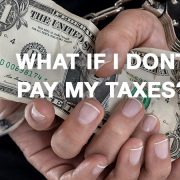Beware: Failing To Pay The IRS Could Land You In Jail
/0 Comments/in Criminal Tax Enforcement, Criminal Tax Litigation – Domestic Tax Issues, IRS Criminal Investigation Division Operation & Developments – Domestic Tax Issues/by Tax AttorneyBeware: Failing To Pay The IRS Could Land You In Jail
The IRS is notorious for taking aggressive collection action including filing tax liens, issuing wage garnishments, seizing assets and levying bank accounts in order to collect outstanding IRS debt. In some cases the IRS is also looking to make an example of what happens to taxpayers who do not cooperate in paying their taxes or even worse not filing tax returns.
Owner Of Colorado Business Sentenced To Prison For Tax Crimes.
In a press release issued by the U.S. Attorney’s Office in Colorado, Douglas A. Wieland, a Colorado paving company owner, was sentenced to prison for failure to pay income taxes. Mr. Wieland was sentenced to 12 months and one day in prison by U.S. District Judge R. Brooke Jackson in Denver, Colorado. In September 2018, Mr. Wieland pleaded guilty to two counts of failure to pay income taxes, in violation of 26 U.S.C. § 7203.
According to court documents, Mr. Wieland owned and operated Performance Paving, a company that performed asphalt and concrete work. Mr. Wieland admitted that, from April 1999 through December 2017, he did not make any payments toward his income taxes. He also admitted that he took steps to conceal his income and assets to prevent the IRS from seizing his assets. He deposited over $1.8 million into a “warehouse bank” account and then used that account to pay for his personal expenses. The purpose of a “warehouse bank” is to maintain the financial privacy of all “account holders” by commingling the funds of numerous account holders in a single bank account, usually at a domestic bank in the United States. Mr. Wieland also cashed checks his customers gave him for his services, and admitted at a court proceeding held in Adams County, Colorado, that he “cashed a check somewhere outside the box so the IRS doesn’t steal it from my bank”.
In addition to the term of imprisonment imposed, Mr. Wieland was ordered to pay restitution in the amount of $166,658.
Mr. Wieland should also expect that after serving his sentence he will be dealing with the Civil Division of the IRS who will be interested in conducting a full scale civil audit.
Penalties For Failure To File A Tax Return or Filing A False Income Tax Return or Under-reporting Income.
Failure to report all the money you make is a main reason folks end up facing an IRS auditor. Carelessness on your tax return might get you whacked with a 20% penalty. But that’s nothing compared to the 75% civil penalty for willful tax fraud and possibly facing criminal charges of tax evasion that if convicted could land you in jail.
Criminal Fraud – The law defines that any person who willfully attempts in any manner to evade or defeat any tax under the Internal Revenue Code or the payment thereof is, in addition to other penalties provided by law, guilty of a felony and, upon conviction thereof, can be fined not more than $100,000 ($500,000 in the case of a corporation), or imprisoned not more than five years, or both, together with the costs of prosecution (Code Sec. 7201).
Willful Failure To File – The law defines that any person who willfully fails to file a tax return as required by the Internal Revenue Code is, in addition to other penalties provided by law, guilty of a felony and, upon conviction thereof, can be fined not more than $25,000 ($100,000 in the case of a corporation), or imprisoned not more than five years, or both, together with the costs of prosecution (Code Sec. 7203).
The term “willfully” has been interpreted to require a specific intent to violate the law (U.S. v. Pomponio, 429 U.S. 10 (1976)). The term “willfulness” is defined as the voluntary, intentional violation of a known legal duty (Cheek v. U.S., 498 U.S. 192 (1991)).
And even if the IRS is not looking to put you in jail, they will be looking to hit you with a big tax bill with hefty penalties.
Civil Fraud – Normally the IRS will impose a negligence penalty of 20% of the underpayment of tax (Code Sec. 6662(b)(1) and 6662(b)(2)) but violations of the Internal Revenue Code with the intent to evade income taxes may result in a civil fraud penalty. In lieu of the 20% negligence penalty, the civil fraud penalty is 75% of the underpayment of tax (Code Sec. 6663). The imposition of the Civil Fraud Penalty essentially doubles your liability to the IRS!
What Should You Do?
You know that at the Law Offices Of Jeffrey B. Kahn, P.C. we are always thinking of ways that our clients can save on taxes. If you are selected for an audit, stand up to the IRS by getting representation. Tax problems are usually a serious matter and must be handled appropriately so it’s important to that you’ve hired the best lawyer for your particular situation. The tax attorneys at the Law Offices Of Jeffrey B. Kahn, P.C. located in Orange County (Irvine), Metropolitan Los Angeles (Long Beach and Ontario) and elsewhere in California are highly skilled in handling tax matters and can effectively represent at all levels with the IRS and State Tax Agencies including criminal tax investigations and attempted prosecutions, undisclosed foreign bank accounts and other foreign assets, and unreported foreign income. Also if you are involved in cannabis, check out what our cannabis tax attorneys can do for you.
San Diego Crypto Currency Trader Indicted And Held Without Bond In The U.S. For Money Laundering
/0 Comments/in Criminal Tax Enforcement, Criminal Tax Litigation – Domestic Tax Issues, Crypto-currency / Bitcoin, IRS Criminal Investigation Division Operation & Developments – Domestic Tax Issues/by Tax AttorneyDo not think that just because digital exchanges are not broker-regulated by the IRS and digital exchanges are not obligated to issue a 1099 form reporting transactions, that your crypto currency transactions will always be a secret. The Federal government is cracking down on non-compliant traders.
Charges Filed Following Investigation By Federal Authorities
The U.S. Attorney’s Office for the Southern District Of California (which serves San Diego) announced on August 17, 2018 in a press release that a bitcoin dealer, Jacob Burrell a/k/a Jacob Burrell Campos, was indicted for international money laundering and is being held without bond. Mr. Burrell was arrested on August 13, 2018 as he tried to enter the United States from Mexico at the Otay Mesa Port of Entry.
According to statements made in court by Assistant U.S. Attorney Robert Ciaffa in the August 17th bond hearing, Mr. Burrell was a prolific Bitcoin dealer who sold approximately $750,000 worth of Bitcoin to hundreds of buyers throughout the United States. He conducted 971 separate transactions with over 900 individual customers, and accepted cash in person, through his bank accounts, and through MoneyGram. AUSA Ciaffa told the court that Mr. Burrell operated as a Bitcoin “exchanger” and his activities constituted a “money transmitting business”. As such, he was required to register with the Department of Treasury, and comply with all anti-money laundering requirements, including reporting suspicious cash transactions. In this case, Mr. Burrell accepted cash “with no questions asked” and in return for a 5% fee, supplied hundreds of individuals with an easy outlet to avoid the anti-money laundering laws applicable to all financial institutions, including licensed and registered Bitcoin exchanges. According to AUSA Ciaffa, Mr. Burrell’s activities “blew a giant hole” through the legal framework of U.S. anti-money laundering laws by soliciting and introducing into the U.S. banking system close to $1 million in unregulated cash.
18 U.S.C. §1956 – Laundering Of Monetary Instruments
18 U.S.C. § 1956(a) defines three types of criminal conduct: domestic money laundering transactions (§ 1956(a)(1)); international money laundering transactions (§ 1956(a)(2)); and undercover “sting” money laundering transactions (§ 1956(a)(3)). Crypto currency traders and marijuana-related businesses need to be aware of domestic money laundering transactions (§ 1956(a)(1)).
To be criminally culpable under 18 U.S.C. § 1956(a)(1), a defendant must conduct or attempt to conduct a financial transaction, knowing that the property involved in the financial transaction represents the proceeds of some unlawful activity, and the property must in fact be derived from a specified unlawful activity.
Violations of § 1956 have a maximum potential 20-year prison sentence and a $500,000 fine or twice the amount involved in the transaction, whichever is greater. There is also a civil penalty provision in § 1956(b) which may be pursued as a civil cause of action. Under this provision, persons who engage in violations of any of the subsections of 1956(a) are liable to the United States for a civil penalty of not more than the greater of $10,000 or the value of the funds involved in the transaction.
Mr. Burrell is being charged with 28 counts of money laundering. Each conviction for money laundering carries a maximum penalty of 20 years in prison and/or a $500,000 fine or twice the amount involved in the transaction, whichever is greater.
Other charges and possible punishment in the indictment include:
- Conducting an unlicensed money transmitting business, in violation of 18 USC 1960. Statutory maximum: Five years in prison, $250,000 fine.
- Failing to maintain an anti-money laundering program, in violation of 18 USC 5318(h), 5322(b). Statutory maximum: Ten years in prison, $500,000 fine.
- Conspiracy to structure international instrument transactions, in violation of 18 USC 371 and 31 USC 5324(c)(3). Statutory maximum: Five years in prison, $250,000 fine.
Indictment Culminated Investigation By Multiple Federal Agencies
The Department Of Homeland Security (Homeland Security Investigation Unit), Postal Inspection Service and the Internal Revenue Service investigated this case.
U.S. Magistrate Judge Karen S. Crawford found that Mr. Burrell had significant ties to Mexico, citizenship in three countries, no steady employment in the United States, the ability to access large sums of cash, and a disdain and unwillingness to comply with U.S. laws. She concluded at the August 17th bond hearing that Mr. Burrell posed a substantial risk of flight, and ordered him held without bail.
Keep in mind that the charges and allegations by U.S. Attorneys’ Office are merely accusations and the defendant is considered innocent unless and until proven guilty. However, regardless of the outcome of this indictment you can bet that Mr. Burrell will likely have to face the Civil Division of the Internal Revenue Service.
What Should You Do?
The IRS is always interested in teaming up with other Federal agencies in their investigations of non-compliance with the laws and with only several hundred people reporting their crypto gains each year, the IRS suspects that many crypto users have been evading taxes by not reporting crypto transactions on their tax returns. Don’t delay because once the IRS has targeted you for investigation – even if it is a routine random audit – it will be too late voluntarily come forward. Let the tax attorneys at the Law Offices Of Jeffrey B. Kahn, P.C. located in Orange County (Irvine), San Francisco Bay Area (including San Jose and Walnut Creek) and offices elsewhere in California get you set up with a plan that may include being qualified into a voluntary disclosure program to avoid criminal prosecution, seek abatement of penalties, and minimize your tax liability.
Los Angeles Crypto Currency Trader Convicted For Money Laundering And Sentenced To One Year In Prison
/0 Comments/in Criminal Tax Enforcement, Criminal Tax Litigation – Domestic Tax Issues, Crypto-currency / Bitcoin, IRS Criminal Investigation Division Operation & Developments – Domestic Tax Issues/by Tax AttorneyDarknet Narcotics Vendors Selling to Thousands of U.S. Residents Accused Of Tax Crimes
/0 Comments/in Criminal Tax Enforcement, Criminal Tax Litigation – Domestic Tax Issues, IRS Criminal Investigation Division Operation & Developments – Domestic Tax Issues, Marijuana Tax Planning & Marijuana Tax Defense/by Tax AttorneyIRS Establishes New Criminal Investigation Group Using Big Data Analytics to Crack Down on Offshore, Bitcoin and Cannabis Tax Evasion
/0 Comments/in California Marijuana Licensing, Criminal Tax Enforcement, Criminal Tax Litigation – Domestic Tax Issues, Crypto-currency / Bitcoin, FATCA, FBAR, Foreign Accounts - Tax Information Sharing, Foreign Accounts – IRS Operations & Investigation Developments, IRS Criminal Investigation Division Operation & Developments – Domestic Tax Issues, IRS Operations & Procedures, Marijuana Tax Planning & Marijuana Tax Defense, Tax Audits & Appeals, Undisclosed Foreign Bank Accounts & Unreported Foreign Income/by Tax AttorneyCannabis Entrepreneurs Accused Of Tax Crimes
/0 Comments/in Criminal Tax Enforcement, Criminal Tax Litigation – Domestic Tax Issues, IRS Criminal Investigation Division Operation & Developments – Domestic Tax Issues, Marijuana Tax Planning & Marijuana Tax Defense/by Tax AttorneyIncome Tax Evaders May Still Face Big Fines And Up To Five Years In Jail After Coming Forward
/0 Comments/in Audits, Criminal Tax Litigation – Domestic Tax Issues, Featured, Tax Collection Actions/by Tax AttorneyTax cheats cost the government real money from the lost revenue and the costs associated with enforcement and collection of unpaid tax liabilities. On the Federal and State levels, enforcement of the tax laws is a priority task to ensure that everyone is paying their fair share. Recently, the South Carolina Department Of Revenue (“SCDOR”) charged 30 employees of the Boeing Company with tax evasion over several years going back to 2011. The employees voluntarily turned themselves in to SCDOR investigators but are still faced with the prospect of hefty penalties and a five-year jail sentence for each charge.
The SCDOR Investigation
According to the news release from the SCDOR, the Boeing employees filed W-4 forms claiming exemption from South Carolina’s state income taxes. Apparently, during tax years 2011 to 2014, the workers claimed state tax exemptions although they did not qualify under South Carolina’s individual income tax guidelines. During the years in question, these Boeing workers also failed to file their state tax returns.
It is important to note that the workers received notices from SCDOR encouraging them to comply with the tax laws prior to issuance of arrest warrants. These Boeing employees were given several opportunities to rectify their tax problems but failed to do so. The tax liabilities ranged from $4,000 to about $20,000 based on collective incomes exceeding $4 million. Boeing issued a statement saying that the company was aware of the employees’ tax issues and were proceeding with their own investigation. Aside from their tax troubles, these employees may face disciplinary action from their employer.
Understanding State Income Tax Regulations
The State of South Carolina collects income taxes from residents earning an income in the state. Residents who earn incomes outside South Carolina would pay state taxes to the second state. If that state does not collect income taxes, the taxpayer must pay state taxes to South Carolina as their residential state. Nonresidents who earn income from South Carolina employers must pay taxes to this state. The state does not use a separate withholding exemption certificate from the Federal Form W-4. Exemptions and deductions that are allowed on the federal form are accepted for the state tax returns. In general, employees who received a full refund of taxes withheld in the previous year and who anticipate no tax liabilities in the current year may claim exemption from state taxes.
Enforcement of state taxes varies depending on the prevailing tax code although the state Department of Revenue is charged with enforcement. The process and penalties may vary, so it is important to consult a tax professional when you are faced with any State as well as Federal tax liabilities.
What Constitutes Tax Fraud?
Tax fraud is the deliberate intent to avoid paying taxes through whatever means despite the taxpayer being fully aware that taxes are lawfully due.Tax fraud may trigger penalties under the definitions of Title 26 in the Internal Revenue Code.
Specifically, Title 26 U.S.C. Section 7201 states that tax evasion is a felony that carries a penalty of imprisonment for at most five years or a $250,000 fine for each charge for every individual or a combination of fine and imprisonment along with reimbursement of court costs.
Tax evasion is an example of tax fraud. Tax evasion refers to all deliberate acts where taxpayers misrepresent their taxable income on their tax returns. This would include actions such as inflating expenses for larger deductions, strategically under-reporting taxable income or failing to file tax returns in a mistaken attempt to avoid paying taxes.
The Truth about Dealing with the IRS and State Tax Agencies
There could be any number of reasons why individuals choose to forego filing their tax returns. In the case of the Boeing employees, it is difficult to say what, if anything, made them believe that they could get away with non-filing and non-payment of state taxes for an extended period. It is safe to say that their end-game was not prison, but it appears to be heading in that direction. Looking at the amount of tax liabilities that each individual owed the SCDOR, it would have been much more sensible to comply with state tax laws. The tax dues were miniscule compared to the criminal penalties should they be prosecuted for tax evasion.
The existing tax code is based on the premise that taxpayers are willing and able to honor their tax obligations as upstanding citizens. As such, the IRS and the State revenue offices have programs in place to encourage taxpayers to voluntarily come forward to resolve their non-compliant status instead of waiting for tax agency notices or letters. Voluntary disclosure by taxpayers may count in their favor when the revenue investigator decides if the case merits criminal prosecution. The IRS also allows payment plans and in some cases, reduction of tax liabilities for low-income taxpayers.
Redemption for Non-filers
Tax laws may be rigid, but the IRS and State Tax Agencies do not exist to go after taxpayers who make simple and unintentional mistakes on their tax returns. However, blatant fraud that includes non-compliance with tax filing regulations over several years and ignoring tax agency notices will trigger an investigation and prosecution if for fraud charges. The tax agencies do not need to prove how much you actually owe in taxes to charge you with tax fraud and possibly secure a felony conviction.
If for any reason you failed to file tax returns or you need to amend any of your returns from the last six years, it is best to consult a tax professional to make sure that you are making the right steps. When you work with a tax attorney or a tax expert, you may not have to deal directly with the IRS or State Tax Agency. Your tax representative takes charge of requesting tax transcripts from previous years if you don’t have them anymore. If you owe taxes and are unable to make full payment at the time your returns are filed, your tax representative can negotiate a viable payment plan.
Don’t wait for the IRS or State Tax Agency to contact you if you have not been filing your tax returns or need to amend information submitted in previous returns. For your peace of mind, consult a tax professional who can guide you through the process to ensure a positive outcome and avoid prosecution.
How To Stay Out Of Jail: Lessons To Learn From The “Queen Of IRS Tax Fraud”
/0 Comments/in Criminal Tax Enforcement, Criminal Tax Litigation – Domestic Tax Issues/by Tax AttorneyCrime doesn’t pay. Despite using money from crime to temporarily fund a lavish lifestyle, Rashia Wilson of Tampa, Florida, learned her lesson the hard way before a Federal District Court Judge in July 2013 when she was sentenced to 21 years of prison for Tax Fraud and Weapons Charges. She is also ordered to pay restitution of more than $3 million. At the time of sentencing she was just 27. When she is released, her children, currently all in elementary school, will all have graduated from high school. Her youngest child will be 23.
While Wilson was briefly able to cash in on her crimes before landing a record prison sentence, the details of her spree read like a “What Not To Do” map when stealing from the government. If you’re one of those folks pondering how best to stay out of jail, here are a few tips:
1. Don’t steal. That should be obvious but clearly, it’s not. Stealing from the government – in particular, identity theft – is on the rise and as a result, the IRS put identity theft resulting in tax fraud at the top of its list. In the scheme, thieves like Wilson access your personal information including your name, address and Social Security number to fraudulently file a tax return and claim a refund without your consent. Wilson gleaned much of the information she used to file fraudulent returns from medical records: in addition to printouts of medical records, investigators found thousands of ID numbers at her home.
In order to combat this level of fraud, the IRS now has 3,000 people working on identity theft related cases, more than twice the number from two years ago. So they’re watching you. If, on the other hand, you believe you are at risk of identity theft due to lost or stolen personal information, contact the IRS Identity Protection Specialized Unit at 800-908-4490.
2. If you did steal, don’t talk about it. Wilson had a big mouth. She liked to talk about herself and her money. She also liked to throw it around. She used the millions she stole from others to finance a showy lifestyle, including $30,000 on her 1-year-old’s birthday party, and $90,000 on a 2013 Audi (which she bought using a money order). She wanted to show off. And that’s exactly how she caught the eye of investigators. Her behavior prompted U.S. District Judge James. S. Moody Jr. to remark at her sentencing, “She knew what she was doing was wrong. She reveled in the fact that it was wrong.”
3. If you did steal, don’t expect your privacy settings on Facebook or use of a fake name to protect you. I don’t care what you think you know about privacy settings, when you put something out there on Twitter or on Facebook, it’s not protected. As a taxpayer, that means you should avoid posting personally identifying information like tax ID numbers and your address (the IRS Facebook page won’t allow you to post comments for that reason). And you should certainly avoid posting photos of yourself surrounded by stacks of cash with such gems as:
I’m Rashia, the queen of IRS tax fraud. … I’m a millionaire for the record. So if you think that indicting me will be easy, it won’t. I promise you. I won’t do no time, dumb b——.
In additional when you sign up for Facebook, the terms of use indicate that “Facebook users provide their real names and information” and you agree that “you will not provide any false personal information on Facebook.” Apparently, this is about the only rule that Wilson followed. She used her real name to create a personal page on Facebook where she regularly bragged that she couldn’t be arrested and teased the police, posting entries like:
I’M RASHIA, THE QUEEN OF IRS TAX FRAUD… I’m a millionaire for the record, so if U think indicting me will B easy it won’t, I promise you! U need more than black and white to hold me down N that’s to da rat who went N told, as if 1st lady don’t have da TPD under her spell. I run Tampa right now.
Granted, that feels like it’s written in code but if you can fumble your way through it, you get the gist. And yes, in case you’re wondering, Wilson isn’t college educated. Or high school educated. Or even middle school educated. She failed the 5th and 6th grades and that’s as far as she got. A lack of punctuation and, heck, let’s face it, actual consonants and vowels, didn’t hold her back from blasting authority figures on Facebook. Turns out, they were paying attention.
Investigators worked for two years to gather evidence against Wilson and a host of other fraudsters as part of Operation Rainmaker so dubbed because of the amount of money that was raining down. Included in that group was Wilson’s boyfriend, Maurice “Thirst” Larry, and a friend, Marterrence “Quat” Holloway.
4. Don’t assume that your luck won’t run out. Born into poverty to a coke addict and a father in prison, Wilson quickly glommed on to a life of crime. She dropped out of school in the 7th grade. Since then, she has been arrested 40 times and held felony convictions for grand theft and burglary, but never did any time in a state prison. She came to believe that her streak would continue, bragging to practically everyone that she would never do any time. That streak ended July 2013.
5. Hire tax counsel now. The sooner you hire tax counsel experienced in criminal tax matters, the higher the chance that further escalation of your case in the criminal arena could be avoided or limited.
Protect yourself from excessive fines and possible jail time. Let the tax attorneys of the Law Offices Of Jeffrey B. Kahn, P.C. located in Los Angeles, San Francisco, San Diego and elsewhere in California defend you from the IRS.
Description: Let the tax attorneys of the Law Offices Of Jeffrey B. Kahn, P.C. resolve your IRS tax problems and minimize the chance of any criminal investigation or imposition of civil penalties.
Keep In Touch
MEET US IN PERSON
Services
- Abatement of Tax Penalties
- Audits And Tax Court
- Business Transactions
- Cannabis / Marijuana Tax Services
- Criminal Tax Investigations
- Crypto-currency / Bitcoin – Tax Representation Services
- Currently Not Collectible
- Delinquent Tax Returns
- Employment And Payroll Taxes
- Entity Formations
- Estate Planning
- Estate Planning For Non US Citizens
- Estate Tax Planning
- FATCA | Foreign Account Reporting Compliance
- FBAR | Foreign Bank Account Reporting
- Full Pay Service
- Income Tax Planning
- Innocent Spouse Claims
- IRS & State Tax Controversies
- IRS Offshore Tax Investigations
- IRS Offshore Tax Investigations
- IRS State Tax Controversies
- Offers In Compromise
- Payment Agreements
- Representation Of Tax Preparers And Other Tax Professionals
- Revenue Officer Assistance
- Tax & Estate Plannng
- Tax Liens And Levies
- Wage Garnishment








 Follow
Follow Follow
Follow